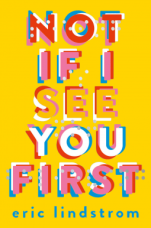 In a trend which I cannot explain, Not If I See You First by Eric Lindstrom (HarperCollins, 2015) is the third book I have read in recent weeks which featured a blind protagonist. The big difference here, however, is that Parker is not out to gain anyone’s sympathy, rejecting offers of help and basically just being really rude to people; in this sense, she represents a complete contrast to the more archetypal blind character, more often than not closer to a martyr than a real person, as seen in All the Light We Cannot See and Salt to the Sea, for example (I really liked both of these, by the way. Just so you know).
In a trend which I cannot explain, Not If I See You First by Eric Lindstrom (HarperCollins, 2015) is the third book I have read in recent weeks which featured a blind protagonist. The big difference here, however, is that Parker is not out to gain anyone’s sympathy, rejecting offers of help and basically just being really rude to people; in this sense, she represents a complete contrast to the more archetypal blind character, more often than not closer to a martyr than a real person, as seen in All the Light We Cannot See and Salt to the Sea, for example (I really liked both of these, by the way. Just so you know).
You don’t get too far into Not If I See You First without realising that Parker has plenty to be angry about besides her blindness, with her mother killed in the accident that took Parker’s sight and her father recently dying too. What’s notable early on is that Parker gives herself no opportunity to feel sad, accepting self-pity no more readily than she does the pity of others. We see Parker enduring normal teenage problems – romance, friendship issues, school pressures – but Lindstrom’s story is made entirely original by the narrative limitations of its speaker.
At times, Parker is wildly abrasive, in ways that could make her quite off-putting as a character, but at no point did I begin to dislike her. She’s not a martyr to her disadvantages and is fiercely proud, presenting people with a list of ‘Rules’ which initially seem like a quick way to avoid friendship altogether; through Parker’s story, however, the reasons behind this list becomes all too understandable.
Rule #1: Don’t deceive me. Ever. Especially using my blindness. Especially in public.
Rule #2: Don’t touch me without asking or warning me. I can’t see it coming. I will always be surprised, and I will probably hurt you.
Rule #3: Don’t touch my cane or any of my stuff. I need everything to be exactly where I left it. Obviously.
A complaint I often have and see others discuss in YA literature is the lack of authenticity in the dialogue; after all, once you’ve crossed that terrible line into being-an-adult, you can never really keep up with how teens actually speak. I say this with authority, having recently endured a long and painful lesson from my students on when and how to use the word “peng;” don’t ask me, by the way. I tried really hard to stop listening. The dialogue in Not If I See You First is, however, authentic and often very witty: harsh in a way that might make an adult wince if they haven’t actually heard teenagers speak recently. I think Lindstrom has done an impressive job of creating believable teenage voices. The more harsh people are, the more Parker seems to enjoy herself, although all of this is presumably some kind of very destructive defence mechanism. I am a psychologist now, clearly.
I know why I’m so sure of everything all the time; it’s because I can’t stomach the alternative, that I can’t ever be sure of anything.
Other things that I liked here were the friendships around Parker and the believable high school dynamics shown. Parker and her friends accurately mirror the shifting affections of teenage relationships. There is, inevitably, a romantic aspect to the story, but this isn’t the main focus, and I really enjoyed the fact that Parker’s friends were so much more important to her than boy drama. Which is not to say that there isn’t boy drama. My only critique of the book would be that the tension between Parker and Scott is a little overwrought and while it doesn’t stray into being unbelievable, I didn’t find it that interesting.
Reading Not If I See You First was a really interesting experience. You can deduce from the book’s title its tone and humour, both of which I really enjoyed; there is a level of snark to the narrative which I appreciated, and the point at which this breaks down is executed really convincingly. Parker’s story, devoid as it obviously is of physical and visual descriptions, means the focus is very much on how she perceives things, and the way in which she begins to understand the gaps in her perception is incredibly well-executed. The choice of a first-person narrator who cannot offer much in the way of imagery is a brave choice and one which makes you question how much you truly need that kind of detail.
As much as Not If I See You First is a book about blindness, it’s also about trust and friendship, grief and coping, and putting yourself back together again when life tears you apart. It’s affecting as well as funny, and Parker is a character whose company I enjoyed.
4 thoughts on “No Second Chances: A Review of Not If I See You First by Eric Lindstrom”